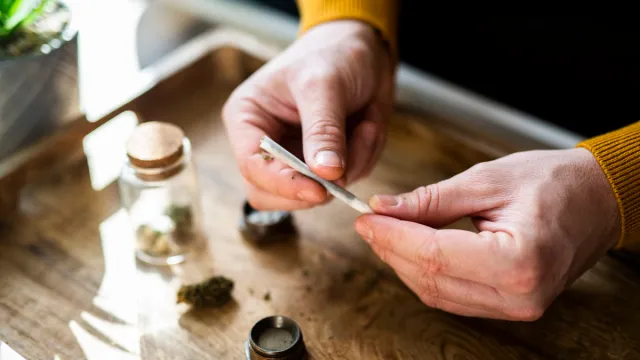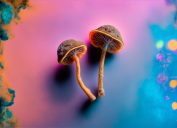Dr. Drew Says New Studies on Marijuana Show "Extremely Worrisome" Side Effects
The well-known TV personality is speaking out about his cannabis concerns.

Many people think of marijuana as a pretty harmless substance. But as the Centers for Disease Control and Prevention (CDC) acknowledges, while a fatal overdose is not the concern with cannabis, that doesn't mean there are no risks when it comes to using this drug. In fact, new research indicates there could be some serious complications for certain individuals. Now, Dr. Drew Pinsky, one of the most well-known medical TV personalities, is speaking out about the "extremely worrisome" marijuana side effects you could experience, based on the latest research.
RELATED: 4 Signs You're Addicted to Marijuana, Experts Warn.
New data from the analytics firm Truveta has found that there is a "complex relationship between cannabis use and mental health." For their research, they studied recent time trends of the rate of cannabis-induced-disorder emergency departments visit and cannabis-involved emergency department visits.
The researchers found a nearly 50 percent increase in marijuana-induced psychosis emergency department visits between 2019 and 2020. Prior to this, a 2017 study in The American Journal of Psychiatry showed that even one psychotic episode after cannabis use was associated with a 47 percent chance of a person developing schizophrenia or bipolar disorder, with the highest risk for 16 to 25 year olds.
"When this first started coming up, I actually was somewhat doubtful. It seemed too much to me," Pinsky said during a Jan. 12 episode of Fox's The Bottom Line. "We were always aware that cannabis was associated with psychotic episodes, but the previous suspicion was it was primarily people who were sort of heading that way already, perhaps that's why they were using the drug."
As of Nov. 2023, 24 states have legalized the recreational use of marijuana, according to The Washington Post. That has made the drug is more accessible than ever before. Not only that, but Pinsky notes that legalized cannabis can also be much stronger than the illicit iteration people used to buy on the street.
"Particularly in the states where it's legal for recreational use, the concentration of the cannabis is so spectacular, it's approaching 100 percent that, literally, it's a different drug, it has a different effect on people," Pinsky explained.
RELATED: 4 Instant Health Benefits of Quitting Marijuana, According to Experts.
As a result of these "incredibly high concentrations of cannabis," the addiction specialist said more "extremely worrisome" side effects are popping up.
"Now, very commonly, we're seeing hyperemesis, people that develop these vomiting episodes that are uncontrolled. It's very common from weed," Pinsky shared. "And psychotic episodes have become increasingly common to the point that they're actually kind of characteristic features to the psychosis these kids are getting from the weed."
Alongside unanticipated psychotic episodes and consequential mental health disorders, the TV personality said we're also seeing more addiction come from marijuana, thanks to its newfound accessibility and the lack of awareness of its potential risks.
"You're fighting a profound cultural bias where they literally have been taught to believe that tobacco is significantly worse than cannabis, and they're right in terms of alcohol, in terms of impact on overall health, in terms of being carcinogenic, in terms of lost work years, yes, the cumulative effects of alcohol are measurably worse than cannabis," he said. "But cannabis is also bad."
RELATED: For more up-to-date information, sign up for our daily newsletter.
Best Life offers the most up-to-date information from top experts, new research, and health agencies, but our content is not meant to be a substitute for professional guidance. When it comes to the medication you're taking or any other health questions you have, always consult your healthcare provider directly.





















